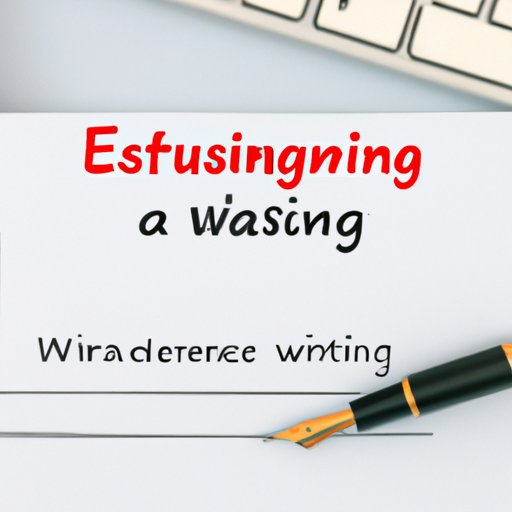The Ultimate Guide to Writing an Effective Essay
Writing an essay is one of the most common academic tasks that students face throughout their academic journey. Whether you are writing an essay for a scholarship application, for an exam, or for any other reason, designing a well-written essay can make a significant difference in your academic performance. Writing an essay might seem like a daunting task at first, but with proper guidance, anyone can achieve a well-written essay that can impress their instructors. In this article, we will discuss the main components of an effective essay and provide you with useful tips on how to approach essay writing.
The Importance of Structure
The essay structure plays a fundamental role in essay writing as it helps in presenting narratives and arguments in a cohesive manner. A well-structured essay exhibits a clear sense of organization that indicates to the reader what to expect from the essay. The structure generally consists of an introduction, main body paragraphs, and the conclusion. There are various ways to design an essay structure, but we recommend the following standard format:
- Introduction: Introduce the topic and provide a thesis statement that identifies the central argument of the essay.
- Body Paragraphs: Three to four paragraphs that provide supporting evidence and arguments to support your thesis statement. Each paragraph should start with a topic sentence that presents the central idea of the paragraph and then provide evidence to support this idea.
- Conclusion: Restate the thesis statement and present a summary of the main arguments presented in the essay.
Tips on Conducting Research Effectively
Research is a fundamental step in essay writing as it provides information and ideas that help in developing and supporting arguments. Conducting research is not just about collecting information; it is also about analyzing the information and understanding how it relates to your thesis statement. Here are some tips for conducting effective research:
- Start by brainstorming and identifying the main ideas related to your topic.
- Use reliable sources such as academic journals, books, and trustworthy websites.
- Take notes as you research. This will help you to organize your thoughts and remain on track with your essay’s central argument.
- Evaluate the credibility of sources by considering the author’s qualifications, the date of publication, and whether the source is peer-reviewed.
The Importance of Clarity in Writing
Clarity in writing is essential in conveying your ideas effectively. The goal is to communicate your ideas in a way that the reader can easily understand and follow. Here are some tips for achieving clarity:
- Use simple sentence structures that are easy to read and understand.
- Avoid using jargon that might not be familiar to the reader.
- Use active voice to make your sentences more engaging and direct.
- Avoid repetitive words that can distract the reader from the central argument of the essay.
- Write concisely: Use fewer words to communicate the same idea. This will make your writing more effective and engaging.
Developing an Argument
Every essay should have a central argument or thesis statement that guides the entire essay. Developing an argument requires a process that involves identifying supporting evidence and addressing counterarguments. Here are the steps to take when developing an argument:
- Identify the central thesis statement of your essay. This should be a clear and concise statement that reflects the main argument of the essay.
- Present supporting evidence to back up your thesis statement. Provide specific examples and quotes from research to support the argument more thoroughly.
- Address counterarguments. Be mindful of the potential objections to your argument and present valid points that contradict them.
Editing and Proofreading
Editing and proofreading are essential steps in writing an effective essay. The revision process helps to refine the writing and polish it to make it clearer and easier to read. Here are some tips for editing and proofreading an essay:
- Take a break before editing to allow you to look at the essay with fresh eyes.
- Read the essay out loud to check for awkward phrasing, grammar mistakes, and punctuation errors.
- Use online tools to check grammar and spelling errors.
- Check for consistency throughout the essay. For example, ensure that the voice and tense used in the essay remain constant.
Examples of Effective Essays
One of the best ways to gain insights into how to design an effective essay is by reading examples of well-written essays. Reading samples can help you understand the structure, tone, and style that is ideal for creating an effective essay. Here are some links to effective essays:
- Who Are You and What Are You Doing Here? by Mark Edmundson
- Obama’s Climate Change Valedictory by Ezra Klein
- Dolemite is My Name Review – Eddie Murphy is Dazzling by Peter Bradshaw
Conclusion
Writing an effective essay requires careful planning, organization, and research. An effective essay should have a clear thesis statement, well-organized paragraphs, and supporting evidence that backs up the central argument. Additionally, the essay should have clarity in writing, use active voice, and avoid jargon and repetitive words. Editing and proofreading an essay helps to refine the writing and ensure that the essay is easy to read and understand. By following these tips, you can create a well-written essay that can earn an excellent grade.
